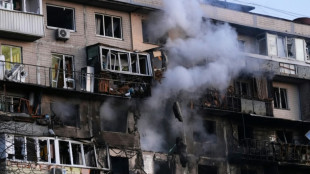
| RBGPF | -3.73% | 75.65 | $ | |
| CMSC | -1.05% | 23.83 | $ | |
| CMSD | -1.4% | 24.21 | $ | |
| JRI | -0.73% | 13.77 | $ | |
| SCS | -0.83% | 15.62 | $ | |
| BCC | -1.59% | 69.18 | $ | |
| NGG | 0.08% | 78.09 | $ | |
| RIO | -0.1% | 71.04 | $ | |
| RELX | 0.14% | 41.42 | $ | |
| RYCEF | -0.34% | 14.91 | $ | |
| VOD | 0.32% | 12.41 | $ | |
| BCE | 1.47% | 23.11 | $ | |
| GSK | 0.15% | 48.14 | $ | |
| BTI | -2.46% | 54.48 | $ | |
| AZN | 1.05% | 88.61 | $ | |
| BP | -1.01% | 36.49 | $ |
Israel launches strikes on Iran

Israel carried out strikes against Iran on Friday, targeting its nuclear and military sites, after US President Donald Trump warned of a possible "massive conflict" in the region.
Israel's operation struck at the "heart of Iran's nuclear enrichment programme", taking aim at the atomic facility in Natanz and nuclear scientists, Prime Minister Benjamin Netanyahu said.
The operation against Iran will "continue as many days as it takes," Netanyahu said.
Iran's Chief of Staff Mohammad Bagheri was "likely eliminated", said an Israeli security official.
Iranian state media said residential buildings in Tehran were also hit, killing a number of civilians including women and children.
Fire and smoke were seen at a key site for Iran's Revolutionary Guards, state TV reported, while explosions were also heard in Natanz city in Iran's central province.
The Guards' leader Hossein Salami was killed in the strikes, Iranian media said.
Air traffic was halted at Tehran's main international airport Imam Khomeini, while neighbouring Iraq has also closed its airspace and suspended all flights at all airports, state media reported.
Israel declared a state of emergency, likewise closing its airspace, with Defence Minister Israel Katz saying retaliatory action from Tehran was possible following the operation.
"Following the State of Israel's preemptive strike against Iran, a missile and drone attack against the State of Israel and its civilian population is expected in the immediate future," Katz said.
An Israeli military official added that the Israeli army believed that Iran had the ability to strike Israel "any minute".
Oil prices surged as much as eight percent while stocks sank on the Israeli strikes, which came after Trump's warning. The US president has also said the US was drawing down staff in the region.
"I don't want to say imminent, but it looks like it's something that could very well happen," Trump told reporters at the White House Thursday when asked if an Israeli attack loomed.
Trump said he believed a "pretty good" deal on Iran's nuclear programme was "fairly close", but said that an Israeli attack on its arch foe could wreck the chances of an agreement.
The US leader did not disclose the details of a conversation on Monday with Netanyahu, but said: "I don't want them going in, because I think it would blow it."
Trump quickly added: "Might help it actually, but it also could blow it."
Secretary of State Marco Rubio warned Iran not respond to Israeli strikes by hitting US bases, saying Washington was not involved.
"Let me be clear: Iran should not target US interests or personnel," Rubio said in a statement.
-- 'Extremist' --
The United States on Wednesday said it was reducing embassy staff in Iraq -- long a zone of proxy conflict with Iran.
Israel, which counts on US military and diplomatic support, sees the cleric-run state in Tehran as an existential threat and hit Iranian air defences last year.
Netanyahu has vowed less restraint since the unprecedented October 7, 2023 attack on Israel by Tehran-backed Hamas, which triggered the massive Israeli offensive in Gaza.
The United States and other Western countries, along with Israel, have repeatedly accused Iran of seeking a nuclear weapon, which it has repeatedly denied.
Israel again called for global action after the UN's International Atomic Energy Agency accused Iran on Wednesday of non-compliance with its obligations.
The resolution could lay the groundwork for European countries to invoke a "snapback" mechanism, which expires in October, that would reinstate UN sanctions eased under a 2015 nuclear deal negotiated by then US president Barack Obama.
Trump pulled out of the deal in his first term and slapped Iran with sweeping sanctions.
Iran's nuclear chief, Mohammad Eslami, slammed the resolution as "extremist" and blamed Israeli influence.
In response to the resolution, Iran said it would launch a new enrichment centre in a secure location.
Iran would also replace "all of these first-generation machines with sixth-generation advanced machines" at the Fordo uranium enrichment plant, said Behrouz Kamalvandi, spokesman of the Atomic Energy Organization of Iran.
Iran currently enriches uranium to 60 percent, far above the 3.67-percent limit set in the 2015 deal and close, though still short, of the 90 percent needed for a nuclear warhead.
Y.Wi--SG

 London
London

 Manchester
Manchester
 Glasgow
Glasgow
 Dublin
Dublin
 Belfast
Belfast
 Washington
Washington
 Denver
Denver
 Atlanta
Atlanta
 Dallas
Dallas
 Houston Texas
Houston Texas
 New Orleans
New Orleans
 El Paso
El Paso
 Phoenix
Phoenix
 Los Angeles
Los Angeles



